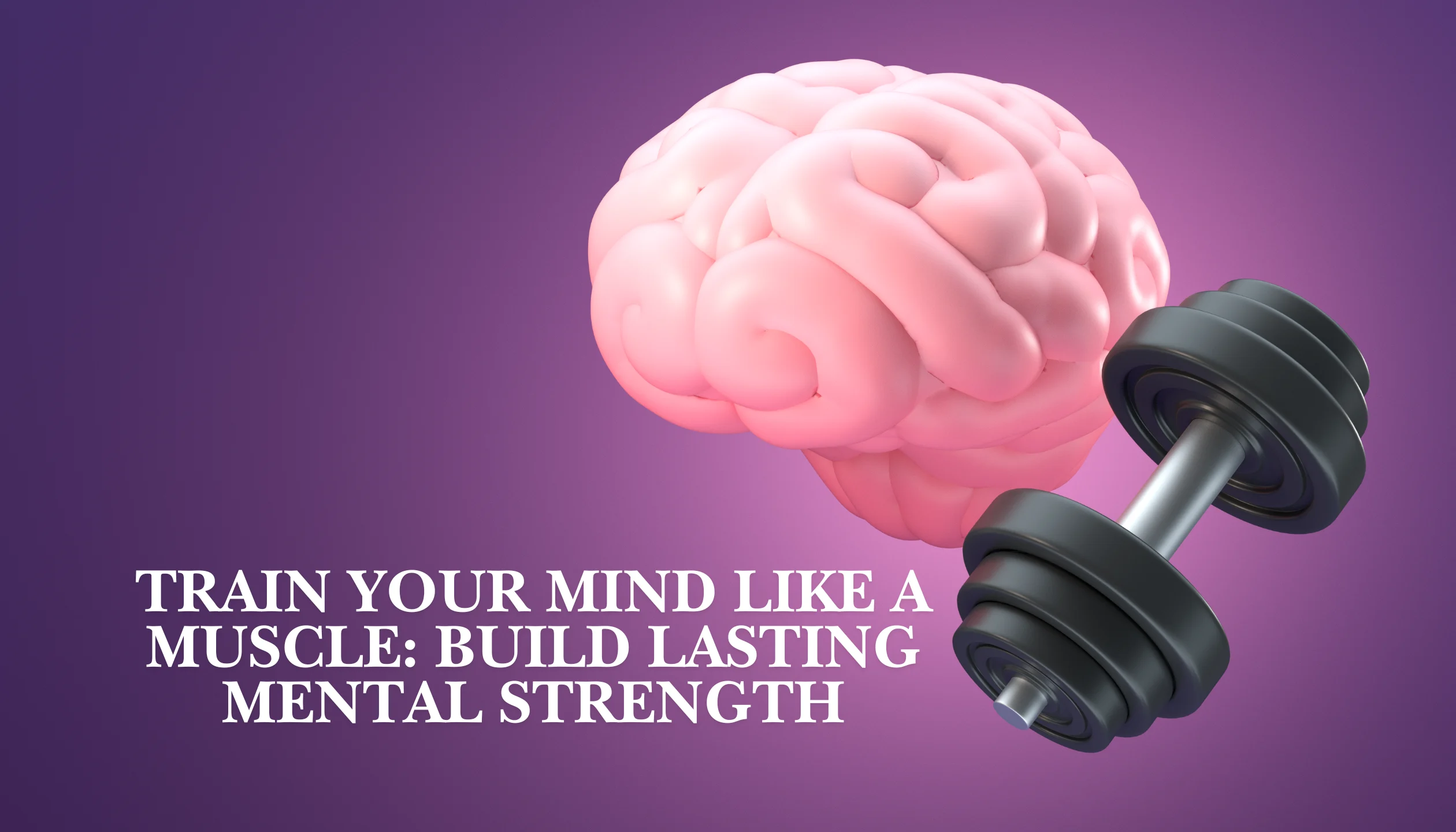Train Your Mind Like a Muscle: Build Lasting Mental Strength

Key Highlights
- Developing mental strength is similar to strength training: it requires consistent daily effort and resilience to overcome challenges.
- A growth mindset can reshape your mental muscle, empowering you to achieve long-term health and fitness success.
- Effective strategies like self-awareness, mindfulness, and positive affirmations help combat negative thoughts and setbacks.
- Building resilience through adversity fosters adaptability and emotional control, key traits for sustainable change.
- Embracing discomfort and reframing failure as feedback are instrumental in unlocking your full potential.
- Daily routines and social support systems are powerful tools to achieve mental agility and consistency.
Introduction
Mental strength is key to doing well in life. It is like physical strength because you can work on it and keep it strong as time goes by. When you have good mental health, you get the tools you need to face problems. This helps you come back stronger after setbacks and builds your resilience and mental toughness. No matter if you are working towards fitness goals or just moving through daily life, training your mind gives you the toughness and fortitude to keep going and do well. Want to know how your mindset can change your wellness path? Let’s look at the main ideas that help you build strong and lasting mental resilience.
Understanding Mental Strength: The Foundation for Wellness
Mental strength forms the base for feeling well. It lets you keep your emotions steady and adjust to new things. You can think of it as a kind of mental toughness. You need this during hard times and when you are working toward your goals. This is true for both your fitness and for things you face in your daily life.
You do not have to ignore stress or setbacks. Instead, you see the tough times as chances to grow. This kind of toughness helps you make better choices. It gives you a strong guide to follow so you can look after your mental health. When you build this foundation, the next thing to ask is: How do you train your mind like you would a muscle?

What Does It Mean to Train Your Mind Like a Muscle?
Training your mind is a lot like strength training for your body. When you do mental exercises, like changing how you think about negative thoughts or imagining yourself doing well, you build up your mental muscle. This helps you get stronger, so you can be more resilient and adaptable in daily life.
Daily routines matter a lot for mental health. They are like your regular “workout” but for your mind. You can think of journaling as reps you do to make things clear in your mind. Practicing mindfulness works like endurance training that helps you stay present. Every time you do one of these habits, you build up the power to face adversity.
If you use the idea of small steps, it’s like building mental fortitude day by day. Just like physical fitness, the results will not come right away. They show up over time when you keep at it. This steady work can make your emotional intelligence and mental agility better. See your mental training as an investment in your mindset, because the effort you put in leads to real changes in wellness and performance.
Key Differences Between Mental Strength and Willpower
Mental strength and willpower are not the same, but both are important. They come from different places and help you in different ways.
| Mental Strength | Willpower |
|---|---|
| Helps you build adaptability and resilience over time | Aims at fighting off urges for a short time |
| Lasts longer and fits into your daily life | Can wear you down and feels weaker when you get tired |
| Leads to mindset shifts, like learning new skills | Depends on quick effort to get past hard things |
| Needs emotional control at its core | Often comes from outside motivation or from feeling guilty |
Mental strength is all about long-term growth and lasting change. You get better with steady work, and this helps you every day. Willpower helps you tackle tough moments right then and there. Both mental strength and willpower work well together. Still, putting more effort into building mental strength gives you more effective ways to see real, long-term benefits in everyday life.
Why Mindset Matters in Long-Term Health and Fitness

The way you think has a big effect on your health and fitness progress. If you have a fixed mindset, you take setbacks as failures. But when you have a growth mindset, you look at problems as chances to learn.
When you face new things with adaptability and perseverance, you build strong emotional control and resilience. By changing the things that hold you back, your mental strength helps boost your physical results. This creates a strong bond between your mental fortitude and your health journey. By finding this balance, you can stick to your goals and keep a positive outlook as you move toward success.
The Science Linking Mindset to Behavior Change
When you think about how your mindset can shape what you do, neuroplasticity is key. This is the brain’s way to change and make new paths. Positive thoughts help create new paths, which build mental agility and help you bounce back during tough times.
The brain’s adaptability lets you face challenges. You do not stay stuck on negative thoughts or get trapped by an old mindset. For example, using mindfulness stops habits that come from stress. This helps you make better choices. Optimism also gives you the energy to keep going toward your goals.
Research shows that people who keep a growth mindset handle adversity much better. They move through setbacks and keep making changes year after year. When you use neuroplasticity, growth can be something you get, even when things get hard.
Common Mindset Traps That Sabotage Progress
There are some common mindset traps that can stop you from moving forward. But you can avoid these traps if you know about them:
- All-or-Nothing Thinking: If you see small setbacks as big failures, it is hard to have steady effort.
- Focusing on Negatives: When you miss your wins or good moments, you can get frustrated and find it hard to grow.
- Perfectionism: Wanting things to be perfect can hurt your confidence and make it tough to bounce back.
- Comparisons: Looking at where others are and measuring yourself against them can keep your mindset stuck.
- Fear of Failure: Trying not to fail means you may not take risks, making it harder to stay flexible and active.
To get out of these traps, you need emotional control and a new way to look at things. Try to see every challenge as a chance to grow. This will help you build perseverance and adaptability in your daily tasks. With time, your resilience will be better, even after setbacks.
Building Resilience Through Everyday Challenges

Resilience does not develop in one day. It grows slowly as you face more adversity. People who deal with setbacks calmly develop the mental muscle needed to handle life’s tough times.
No matter if you deal with problems in fitness or your own life, resilience helps you keep your mind clear. It lets you see obstacles as new chances. Simple habits, like saying positive affirmations and doing mindfulness every day, can make this trait stronger. Over time, if you let resilience grow in you, you get ready to be tougher, even when there is discomfort. This skill is important for anyone who wants to reach success and keep going strong for many years, in many parts of life.
Embracing Discomfort to Grow Stronger
Discomfort is a training ground for your mind. It helps you build mental strength. When you feel out of your usual routine, you start to grow in real ways.
If you can let yourself feel open and honest, you work toward better emotional intelligence and adaptability. These traits are important for strength and resilience. Always facing new challenges makes your brain change through neuroplasticity. It pushes you toward a growth mindset.
Try not to always seek comfort. It keeps you stuck. Face discomfort on purpose and be curious about what you feel. As you keep moving past your old limits, you will build fortitude and mental agility. With time, this habit guides change that lasts.
Turning Setbacks Into Opportunities for Growth
Setbacks can be tough and make you want to give up, but they can also help you grow. When you fail, if you have a strong mind, you do not let yourself get stuck in negative thoughts. You look at each hard moment as something to learn from.
For example, when you have a big job to do, break it down into smaller steps. This way, what felt like failure can become progress. Dealing with adversity also makes you learn perseverance. You get new skills that you can use in other parts of your life.
Setbacks show you what you are made of. They test your resilience and help you prepare for what may come next. Every time you do not hit your target, you get stronger in your comfort zone. You learn about adaptability, and you start to shape your mindset for more success in the future.
Strategies to Rewire Negative Self-Talk
Negative self-talk can hold you back and make you doubt what you can do. The good news is that you can change this pattern. It starts when you notice the beliefs that stop you. These quiet thoughts can be easy to miss but they keep people from moving forward. After that, try to change how you speak to yourself. Start having positive self-talk to help your mind focus in a better way.
There is proof that using positive affirmations helps with mental health. They give you real, good results and boost how you feel. Turning down your inner critic helps people build up resilience and keep your composure. In this way, you can develop a mindset that gives you lasting confidence, even when you have to face adversity.
Identifying Limiting Beliefs and Inner Critic Patterns
Limiting beliefs can feel confusing. The way you think shapes your mental state and the choices you make. Many people often think things like, “I’m not good enough,” or, “I’ll never win or do well.” These ideas often come from your inner critic. They start after you have a setback or don’t get what you want.
To spot these beliefs, look at your automatic thoughts after something goes wrong. Ask yourself, do you blame yourself too quickly? This is how you find out what is holding you back. When you write these moments down in a journal, you help yourself see what is really going on. This will be the first step to change.
If you want to work on your mindset, try to see your fears as a chance to learn. This can help with your adaptability. It also helps you stay focused on growth, no matter what comes your way.
Practical Tools for Cultivating Positive Self-Dialogue
Here are ways you can help build better self-talk and a strong mental muscle:
- Positive Affirmations: Make short and powerful statements like “I am able to get past hard things.”
- Mental Exercises: Try picturing yourself winning to keep your thinking positive. This can help your mental edge stay strong.
- Journaling: Write about your good points or small wins each day. This helps bring clarity and keeps you focused.
- Mindfulness Practices: Use deep, slow breathing to calm yourself when you feel stress.
- Reframing Negatives: Change “I can’t” to “I can try another way.” This helps you keep trying and build perseverance.
Using these ideas makes your mental muscle strong and helps you deal with adversity. This also boosts emotional intelligence, giving you more clarity and self-control in tough moments.
Strengthening Mental Muscles with Daily Habits
Consistency is the base of mental toughness. Like you build physical strength by doing reps every day, your mental muscle grows from habits such as mindfulness and thinking about your day.
Things you do again and again, such as journaling and meditation, help the mind with emotional control and make you more resilient. These habits give you the power to reach any long-term goals. If you put mental exercises first in your daily life, you will find real clarity, fortitude, and composure in everything you do. When you keep up with even small efforts, they add up over time and bring big, lasting change.
Micro-Habits That Build Consistency Over Time
Small daily actions can turn into big changes for you over time. Simple things—like making a gratitude list or seeing yourself succeed—can help with your consistency and adaptability.
Try to pay attention to things that come up again and again in your daily routine. You can do things like take a few mindful breaths before hard meetings, or write down your wins in a journal at night. You might also enjoy hobbies that help you focus, like jigsaw puzzles. These activities boost your mental agility.
If you keep at these micro-habits, you help build a good growth mindset. This makes it easier to keep clarity about your goals and keep going. Over time, you will move closer to lasting accomplishments.
Mindfulness and Meditation for Enhanced Focus
Mindfulness and meditation help you focus and calm your thoughts. When you use these practices, the mind can be steady. It gets ready to deal with adversity and helps you keep composure.
You can try mindful breathing. You feel each inhale, and that helps settle you down. Meditation gives a mental edge by letting you get rid of negative thoughts. It helps you build emotional intelligence. There is research on things like walking meditation. These studies show it can help people be more attentive and lower their anxiety.
If you put mindfulness into your routine, you make your resilience stronger. Everyday actions can turn into easy tools for mental clarity. This helps you face new days with a clear mind.
Social Support: The Hidden Power Behind Mental Strength
No one can build mental fortitude by themselves. We need others to get stronger in our minds. Social support can make your mental strength better. It gives you help and drives you forward when you have problems.
When you are close to others, it can help keep negative thoughts out of your way. They remind you that you all have resilience and clear goals. Sticking close to resilient people keeps you strong. They help with your feelings and push you to have more perseverance when times get hard. Use this hidden power in your daily life to help keep your mental agility and mental strength working for you every day.
Building Your “Accountability Circle”
Your accountability circle is made up of trusted people who help you stay on track with mental strength training.
They can be your family, friends, or a coach, and they act as a support system. In tough times, they remind you not to lose focus, especially during setbacks. These trusted people help you by giving you clarity. They show you new ways to build up your resilience and help you adapt your habits when life changes.
Spend your time with people who have adaptability and emotional balance. This will make your mental strength training much more effective. Work together to come up with daily tasks that everyone can do. This helps all of you grow and get stronger as a group.
Asking for Help Without Feeling Weak
Breaking the idea that asking for help is bad is an important way to build your mental muscle. When you reach out to others for guidance, it shows you have emotional intelligence, not weakness.
Start by having caring talks. When you explain your challenge in a clear and simple way, it helps other people know exactly how to help you. This way, they can give support in a way that fits your needs, and you don’t have to worry about being judged.
You can talk to resilient people or use help from professionals. Asking for help is a good way to take care of your mental clarity and fortitude. Don’t limit yourself by thinking that needing others is a bad thing. It’s actually a big part of how we grow and adapt.
Creating a Growth Mindset for Sustainable Change
Adopting a growth mindset helps you get lasting wellness changes in your life. When you move from fixed habits to becoming open to learn, you build more mental agility.
For example, you can see failure as a step forward, not the end. Try to choose perseverance instead of just giving up. When you face adversity and learn from it, you set up real change and leave space for new skills to come out naturally. By using mindset-reset tricks like looking at setbacks in a new way, you match your growth with your emotional health, and you also support mental strength training.
Redefining Failure as Feedback
Seeing failure as feedback can help you find new chances to build resilience and mental agility. Instead of worrying about mistakes, strong people welcome adversity.
You can look at every setback as information. This helps you find your strengths and see what you need to work on. If you try new skills or routines and fail, treat those moments as lessons. For instance, if you try endurance exercises and they do not work out, notice where your perseverance was tested. This can help you get better next time.
See what happens as important steps that grow your mental muscle. Do not think of these moments as the end, but as part of your progress.
Celebrating Small Wins to Boost Motivation
Small wins help you feel more motivated and show your progress. They remind you that your hard work is making a difference, even when you face bigger problems.
You can use tools like daily journaling to keep track of these small successes. This could be about sticking with mindfulness, handling setbacks in a good way, or taking the time to see how you feel. If you let yourself feel good about each win, it can help you grow mental agility and get more clarity about your future goals.
When you notice these victories, it helps your brain focus on feelings like gratification. This builds the momentum you need to keep going with your mental strength training. Make sure you celebrate them—your growth is important and worth your attention.
Conclusion
To sum up, treating your mind like a muscle can help you build lasting mental strength and better overall wellness. You need to see how mindset is key for both health and fitness. It is a good idea to deal with some discomfort and use daily habits that make you more resilient. This will help you talk to yourself in a kind and useful way, so you can move forward. Keep in mind that setbacks are not the end. They be a chance for growth. When you make an accountability circle and look at challenges in a new way, you will find that every small win adds up over time. These little wins push you closer to real and lasting change. Make your mental health a top thing for you right now. If you want more help and need some plans that fit your life, get a free talk with our experts. They will help you get started on this path.
Frequently Asked Questions
How long does it take to build mental strength?
Building mental strength does not happen all at once. It needs you to be consistent each day and to keep going, even when it feels hard. You will see positive effects if you stick with mental strength training and mindfulness. This can take weeks or even months. How fast you notice changes will be based on your own level of commitment and the time you give to this work.
Can anyone become mentally strong, or is it genetic?
Mental strength is not something you are only born with. It grows when you put in hard work and have a growth mindset. Anyone can get new skills, like being adaptable or having better emotional control. This happens when you try effective ways, such as doing mental exercises often. Strength training for the brain helps people, no matter who they are, to have a good chance at success.
What are some warning signs of mental fatigue?
Mental fatigue can show up as negative thoughts, trouble with emotional control, having a lot of setbacks, or feeling tired even after rest. When you see these signs, it is time to recharge. You can do this by trying mindfulness, meditation, or hobbies that help bring back your resilience and clarity.
How do I stay motivated when I want to give up?
When you go through tough times, try to use positive affirmations. Think back to your past wins, and talk to your accountability circle to find some motivation. For your mental health, it can help to look at setbacks in a new way or to show compassion to yourself. When you feel stuck, these tools can give you support. Your strength is seen in how you adapt and get through hard challenges.
Are there daily exercises to train my mind like a muscle?
Yes, daily exercises such as visualization, mindfulness, meditation, and journaling can help with mental strength training. You can use small habits to build up your resilience and clarity. This will help you stay strong and ready to face adversity. Keeping these practices up every day will also improve your mental strength over time.


